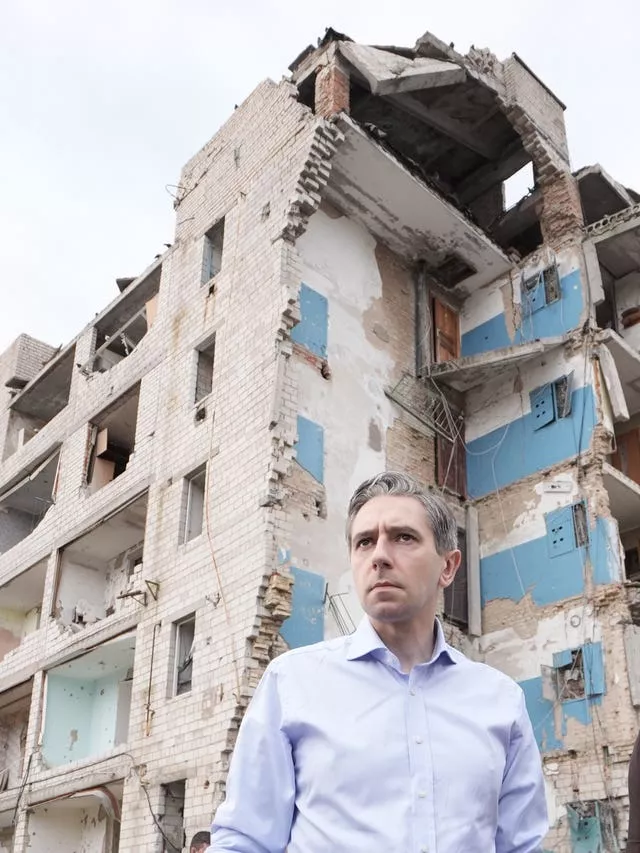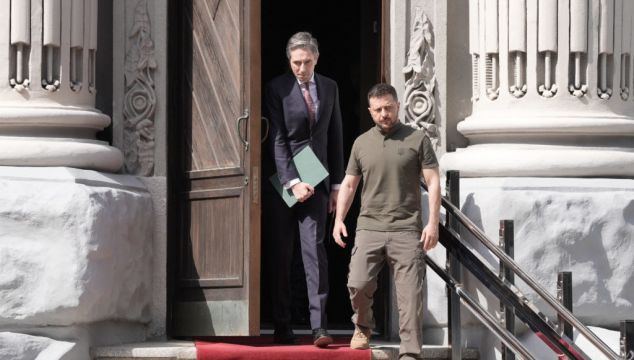The war in Ukraine cannot “fade into the background”, the Taoiseach has said during a visit to Kyiv.
His comments come after a mother and her three daughters were identified among seven killed in a Russian strike on Lviv.
Mr Harris, who had travelled through Lviv on a train hours earlier, described the killings as a “vicious terrorist attack by Russia”.
He said attacks on civilian infrastructure and homes by Russia was becoming a “very regular and sometimes daily occurrence”.
Speaking to reporters, Mr Harris said: “This war, this terrorism, this barbarism is still continuing on the continent on Europe and in a country that wishes to be, and I wish to be, a member of the European Union.”
It came after Ukraine’s President Volodymyr Zelensky expressed “gratitude to Ireland” for continued financial support.
Mr Harris signed a co-operation deal with Mr Zelensky following a bilateral meeting at the Ukrainian leader’s office at Horodetskyi House in the city.
The Taoiseach also announced details of a 36 million euro funding package to organisations working in Ukraine and neighbouring countries.
The visit comes a day after 53 people were killed and 200 injured when two Russian ballistic missiles struck a military training facility and hospital in Poltava, 200 miles south-east of Kyiv.
The attacks came as Ukrainian forces attempted to secure territory in Russia’s Kursk border region after a surprise incursion that began last month – and as the Russian army moves deeper into eastern Ukraine.

Mr Harris’ engagements on Wednesday saw him visit Hostomel and Borodyanka, two areas which had been badly damaged by Russian strikes in the early days of the invasion.
He said: “I want to see first-hand and with my own eyes the impact of war on the continent of Europe.”
Mr Harris saw a prefabricated home, which is now occupied by a family that had previously been displaced, and a newly-built nursery – both part of projects which Ireland financially supports.
The Irish Government said the 36 million euro package will provide essential humanitarian assistance, support rehabilitation and eventual reconstruction, and contribute to Ukraine’s longer-term goals, including peace, stability and political aspirations.
The Taoiseach also expressed Ireland’s full support for the Ukrainian bid for EU membership while also discussing continued humanitarian assistance.
Mr Harris also visited the child protection centre in Kyiv prior to his meeting with Mr Zelensky, where Ireland supports work towards the return of thousands of Ukrainian children abducted into Belarus and Russia.
Since the beginning of Russia’s full-scale invasion, Ireland has steadfastly supported Ukraine, providing assistance amounting to approximately €380 million. Today, together with Ireland’s Taoiseach @SimonHarrisTD, we signed an Agreement on Support for Ukraine and Cooperation… pic.twitter.com/ouMPbpWPdW
— Volodymyr Zelenskyy / Володимир Зеленський (@ZelenskyyUa) September 4, 2024
He later inspected the Trypilska thermal power plant, a key piece of energy infrastructure which was destroyed by Russia earlier this year.
Following the bilateral meeting, Mr Zelensky told a press conference that he thanked Ireland for its support of work on returning abducted Ukrainian children to the country.
“Ireland’s participation in the reconstruction of Ukraine will be a substantial support for our people and our countries, and our European way of life.
“I thank the people of Ireland, I know that after the beginning of the invasion of Russia of our land, you’ve accepted and really have warmly welcomed more than 100,000 citizens of Ukraine.”
The deal includes common work on demining Ukraine, which Mr Zelensky said will save Ukrainians and improve the resilience of Europe.
He added that the deal also includes common work on cybersecurity.

Mr Zelensky said he also “really valued” that Mr Harris’ trip came amid severe attacks on Ukraine.
“We value that while Ireland is military neutral, Ireland does not stay morally neutral.
“We are grateful to you, Mr Taoiseach, and to the people of Ireland for very specific and clear and principled support, and a position countering Russian terror.”
Mr Zelensky thanked Ireland for financial support and said: “It is really important we are together protecting lives, especially now we need it facing the winter when Russia goes on striking our energy infrastructure.”
Mr Harris, who earlier laid a wreath to honour Ukraine’s war dead at Maidan Square, told reporters: “The people of Ireland stand with the people of Ukraine.”
Asked by members of the Ukrainian media about the Irish Government’s decision to decrease financial support for newly arriving Ukrainians in Ireland, Taoiseach Simon Harris said “Ireland will always continue to support people from Ukraine”.

Mr Harris said the roughly 109,000 Ukrainians who have been welcomed in Ireland “made an incredibly positive contribution to Irish society”.
However, he said refugee systems are always under review in terms of sustainability.
He noted the changes applied to people who were being provided with free food, accommodation and a right to work.
Pressed on whether he supported a visa waiver for Ukrainians post-war, Mr Harris said he hoped there would be a situation where that would not be necessary due to Ukraine joining the EU.
Asked if he supported Ukraine’s request to use long-range missiles at Russian targets, Mr Harris said that would be a matter for the countries supplying such weapons as Ireland’s assistance is around non-lethal aid.
Mr Zelensky said it would be a matter for further discussion with Ukrainian Prime Minister Denys Shmyhal but added he was “really thankful” for the support thus far.

Mr Harris, who later met Mr Shmyhal for a working lunch, said he was “particularly pleased” to invite Mr Zelensky for an official visit to Ireland, to which the Ukrainian president nodded.
The Taoiseach also held engagements with representatives of the Irish community in Ukraine.
The latest cash will take Ireland’s total funding to Ukraine since February 2022 to more than €380 million including about €130 million in stabilisation and humanitarian support.
As part of a policy of military neutrality, Ireland does not provide what it characterises as lethal aid to Ukraine, including weapons.
However, the state has provided €250 million in non-lethal military assistance under the European Peace Facility and has welcomed approximately 100,000 Ukrainians under the EU temporary protection directive.
Irish Defence Forces members have trained hundreds of Ukrainian personnel in demining, battlefield casualty care and the use of non-lethal mine clearance equipment.







